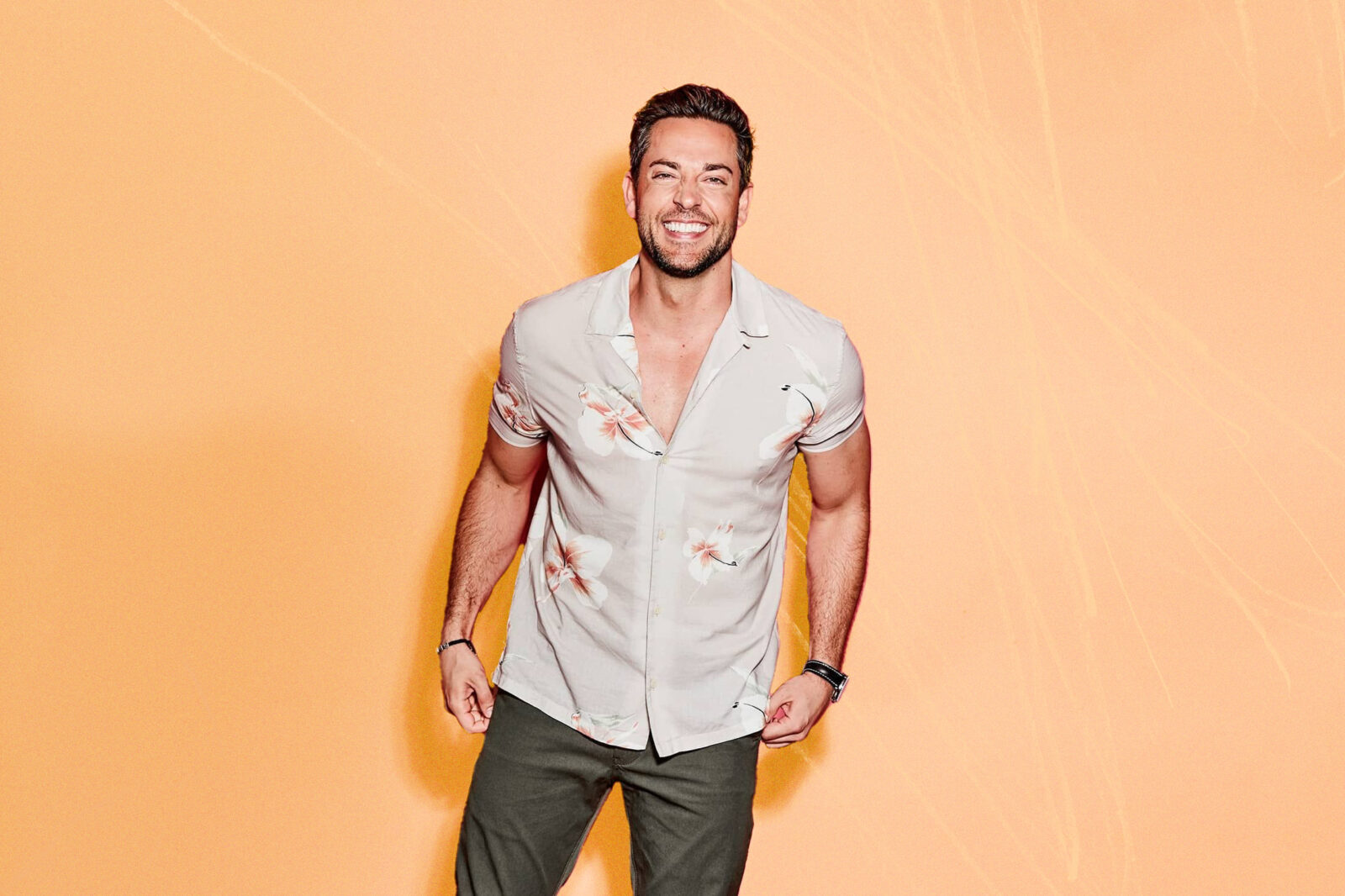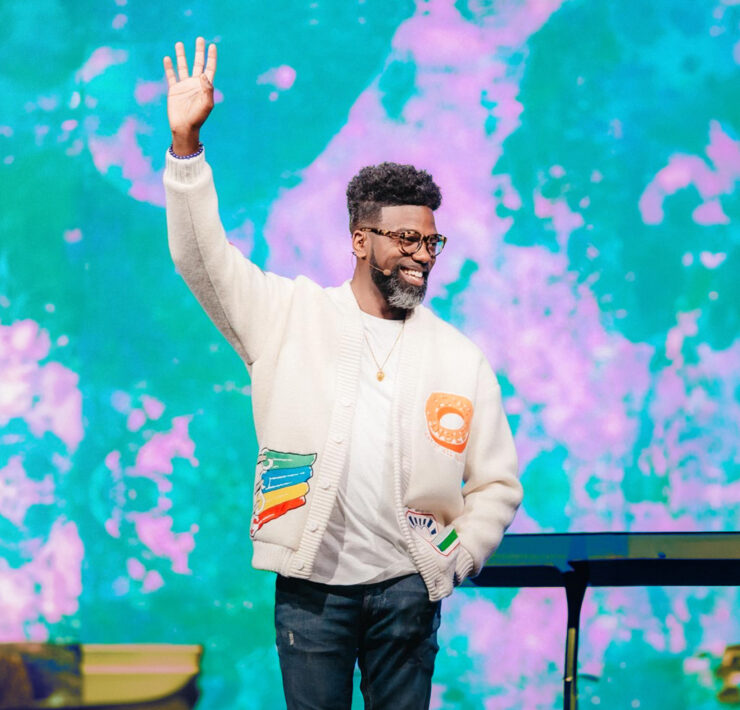Our society is arguably overrun with celebrity memoirs. Every week, a new actor, musician or influencer seemingly releases a “tell all” book about their journey to stardom. But not every memoir is the same, just as we see in actor Zachary Levi’s Radical Love. While Levi does dive into his story, he centers the book on his mental health journey as opposed to his rise to fame.
Levi said that while he was a bit nervous to release this version of his story, he hopes that others will be able to resonate and learn from his past so they may have a better future.
“I think it’s our responsibility to be authentic and vulnerable enough to share our struggles,” Levi said. “The more those of us with followings or platforms are honest about our struggles, the better it’s going to be for all of humankind.”
Levi opened up about up a bit more about his mental health journey, what radical love practically looks like, and how forgiveness has the power to heal our world.
This conversation has been edited for clarity and length.
What does the phrase Radical Love mean? What does Radical Love look like when put into action?
The term “love” itself often has to do with a lover or romance or feeling good about ourselves or someone else. But I don’t think that’s what love is at all. I think that love is a choice you make. To love someone is to see past all of the brokenness and damage in that person, all of the things that they might be doing very wrong in the world. It means choosing to see the human being in them. And that requires a very radical sense of what love is because it’s tied to radical acceptance. And that’s a really hard thing for people to wrap their head around. We don’t like to believe that the people who are doing “wrong” in the world are doing their best. We think they’re all evil and choosing to do bad. But the truth is, they’re just a product of their environment. They grew up in a different place with different people. Different society, different rules, different morals even, and they are a product of all of that conditioning.
In order to truly love our neighbors and truly love ourselves, we have to radically accept first that we are all doing our best. We have to radically accept that people are not going out of their way by and large to hurt us or do us wrong. In my case, in order for me to truly forgive the abuse that I suffered at the hands of my parents, I had to radically accept that they themselves were also abused in their life. And so, in order to radically love them, first I had to radically accept them even if I didn’t like them or feel comfortable around them, and even if that meant I had to place boundaries with them. I can choose to radically love that person and say they are still worthy of love because they are an extension of God and therefore worthy of love.
You mentioned in the book that there’s a difference between “fixing” something and healing. How would you explain emotional healing to someone?
I would say I started feeling my own emotional healing when I went to this life-saving therapy that I talk about in the book. I went to three weeks of very intensive therapy and healing, and it got me back on track just enough just to begin my healing process. But it has been a continuous journey since then and that’s one of the biggest things I learned after leaving that place. I thought that I was going there, and for the most part, I’d be fixed once I was out. But it doesn’t work like that, and as it turns out, I wasn’t fixed. I was, instead, put on a journey of healing. And that journey of healing is an ongoing process. It is not a one-and-done. Like I said, mental health is like dental health. It’s a daily caretaking. In the same way that you would go and take care of your lawn… you have to remove the weeds daily and ensure that it’s healthy. It’s an ongoing process that doesn’t end.
Why is it important for people to share their trauma stories? Why do you think sharing leads to healing?
Silence is the worst thing you choose. Silence is the darkness. Silence is the enemy, which means talking is the antidote – a shining light. And light is the greatest disinfectant. So, sharing our story is paramount. I think we have to be able and willing to share our story and seek help and know that we are worthy of that help and in investing in ourselves and our health.
There’s definitely a balance in it though because there’s also another pitfall that we can fall into, which is victimhood. I think that people learn early on, if you can make a very compelling argument that you’re a victim, lots of people will show you grace, and people can become addicted to that. So, it’s both speaking your story and your truth but also recognizing that we are all still responsible for our own healing. Speak your stories…everyone ought to do that and needs to do that. Particularly with professionals who then help us understand and unpack that story so that we can really heal from it and move beyond it.
Your book touches on developing forgiveness for yourself and others. It’s clear that forgiveness can take years. Do you have any advice for someone struggling with forgiveness?
Forgiveness is hard but it’s not impossible. Truthfully, one of the biggest things I learned about forgiveness is that it has nothing to do with the other person. One of the best adages or proverbs I’ve ever heard is “Unforgiveness is like drinking poison and hoping that the other person will die.” So, forgiveness is really for us. It doesn’t mean that we’re just supposed to forgive and forget and move on right away. We have to metabolize and feel our pain. All feelings are good. It’s what we do with those feelings that can become not so good.
I think radical acceptance and radical love helped me greatly with the forgiveness process because I was able to truly forgive my mom, and not just my mom, but other people in my life and in this world. Through practice, I’m able to look at them as their five-year-old selves and see the innocent little child that, before they were ever programmed one way or the other, would just love another five-year-old. As far as forgiveness is concerned, that’s what can help lead us there. By just acknowledging that the other person across from us, who may well be abusing us, is in fact, doing that out of their own unhealed trauma. It is not that they’re evil, and it’s not personal. Even though it might feel very personal, it’s not. They are broken. They are in need of a lot of healing in their life as well.
Also, forgiveness does not mean that you have to let somebody back into your life to abuse you anymore. Forgiveness is radically accepting that they were, as crazy as it sounds, doing the best they could with the tools they had at the time.
You mention in your book that along your journey, you felt like you lost the most important thing – God. Why did you feel that way and how did you find your way back to Him?
My whole life, I’ve just always been a deeply spiritual person. Even as a young child, I felt a very deep sense of faith and I understood what it meant. I’d always felt a connection to God – like He was there with me, talking to me. Not audibly talking to me, but I could feel the way God would kind of, you know, just very gently pull on the heartstrings inside of me to guide me in certain ways. I’m really, very grateful for all of that. When I had my breakdown, it was after a lot of what felt like big failures in my life – things that I was trusting God to help guide me through. I felt very abandoned. I felt like my life was falling apart and I didn’t feel God anymore in those moments. That’s pretty much why I lost my faith during that period. It was the first time I’d ever really come to the place of, “I don’t know that there is a God because I don’t know how to make sense of any of this. If there is a God, I don’t know why I’m going through what I’m going through.”
Now, on the other side of having gone through all of that, my faith has been renewed because I did survive and gained greater knowledge and a lot more empathy for myself and for other people. It was not a season of my life that was unredeemable. In fact, the opposite. In the middle of going to that therapy was when it changed my life enough where I’d booked “Shazam,” which was my biggest career shift. It was an incredible blessing, and it came out of nowhere and so much of it had to do with the fact that I was going to this therapy that helped me be capable of handling that responsibility. All of these things have led me back to believing, perhaps even more passionately now. Because every single time God redeems something that feels unredeemable, I can do nothing but marvel at how incredible it is. And I am so grateful that my season of not wanting to live anymore can now help other people going through that same struggle with darkness and inspire them to want to keep on fighting to live.
You say in your book that you believe God has created all of us to be conduits of love, light and life. What does that mean to you?
God is very real and that He is for us. I also think that there is light and darkness in the world and we are ultimately pulled or called by this powerful, positive force that is God. And I think that all things that are light and all things that are loved and all things that are life is God. From every blade of grass to every drop of rain, God flows through. But I do believe that we as human beings are one of the coolest extensions of God because we have life that runs through us. If life did not run through us, we’d just be some sack of meat that was just lying on the ground with nothing animating us or moving us. No soul. Nothing to give us true life. We’re a miracle!
But I think that at our best we are (when we allow ourselves to really be used) conduits of God’s power, light and love. That is our highest calling. That’s what I want everybody to recognize in themselves and in each other. We are to be light and love for ourselves in our own lives, loving ourselves, recognizing that we are beautiful, sacred extensions of God’s very light and see that in everyone else. Even the people that seem unlovable…who we don’t understand how they can possibly be an extension of God’s light if they do this or that or whatever. And you say to them, “Because they do not know. Forgive them for they know not what they do.” You know, that’s the kind of stuff that we need to be practicing more of. And so, we need to remind ourselves daily that we are all beautiful and powerful extensions of God’s light, and that life and love is paramount in all of it.

























